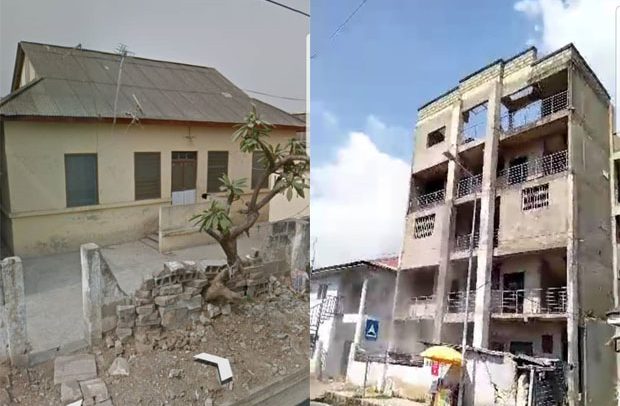“Better be unborn than untaught, for ignorance is the root of misfortune” – Plato
It is very alarming to see the increasing number of unauthorised structures put up in the Central Business District (CBD) in the Greater Accra Region which have become a worry for traditional rulers, and city authorities.
These structures which directly affect spatial planning also destroy the compatibility of various land uses, beauty, and health of communities as they have been developed without obtaining the necessary permits from authorities.
This is usually attributed to ignorance of building regulations and building permits on the part of landowners.
Taking the newly established Osu Lokko Road 5-storey building for example, it is a clear case of a sprouting unauthorised building, situated in the heart of the Korle Klottey Municipal Assembly (KoKMA) in Accra.
With the immense threats it possesses, residents according to the report, have raised an alarm over it possibly collapsing due to its weak foundation.
The near-collapse building which is said to belong to the aunt of one Mr. Bruce, a prominent individual in the area has been a nuisance to residents. They have made numerous calls to city authorities as a matter of urgency, to see to the demolishing of the property before the unfortunate happens.
According to an anonymous source from the assembly, the land owner was given authorisation to put up a two-story building (two floors) but ended up putting up an extra three buildings to make a five-story building, contrary to what was permitted.
The haphazardly developed building which comes in the form of residential apartments also possesses future threats of flooding.
The source also revealed that Mr. Bruce’s aunt was instructed to conduct a structural intelligence report which confirmed that the building was not suitable for rehabilitation.
KoKMA Action
After the assessment report, Municipal Chief Executive (MCE), Samuel James Nii Adjei Tawiah, under his direction leniently called for the demolishing of the two top floors of the building.
The assembly began the demolishing of the building as instructed but later ordered the developer to undertake the demolition exercise upon appeal to the assembly, under the supervision of the assembly.
As enshrined in the Local Government Act 1993 (Act 463), Sections 51 and 52, unauthorised structures on any public property could be stopped and even demolished without notice and the developer could be surcharged with the cost of demolition.
Other planning Acts that have been formulated to regulate urban growth are the National Building Regulations of 1996 (LI 1630), the National Development Planning (Systems) Act of 1994 (Act 480), and the National Development Planning Commission Act of 1994 (Act 479).
All these Acts that have been designed to guide and control the extent of developments in Accra have remained dormant. The laws in the Acts are not mostly implemented as they were originally instituted.
Demolishing Danger
Upon various visits to the site, the developers have thrown all safety standards out of the window creating an unsafe working environment and endangering indigenes in the catchment areas. They have undertaken the demolition exercises under the blind side of the assembly, causing harm in the areas.
One could witness from heights, falling debris, structural instability, dust, and fumes polluting the entire neighbourhood.
Teachers of the Amsah International School, hairdressers and business owners around the area have been at the receiving end of the hazardous practices by the developers.
“The contractors undertook the demolishing exercise without taking into consideration any safety measures. As it stands now most classes are full of dust, affecting teaching and learning currently. This building is a dead trap and authorities must do something about it,” one teacher told the paper.
Call To Action
Recently, a three-storey building situated at Ofankor Market near Asofan collapsed as a result of a weak foundation, and inability of the assembly to conduct structural intelligence assessments on buildings that possess threats of collapsing in the community.
Even though no casualties were recorded it was reported that the Public Relations Department of the Ghana National Fire Service (GNFS) who conducted the investigation on the collapsed building, were unable to ascertain whether the building had a valid building permit.
Similarly, the three-storey building of ‘Word In Action Church’ at Old Bortianor in the Ga South Municipality collapsed injuring seven construction workers.
These unauthorised and death-threating buildings scattered across the city need to be addressed before the issue escalates. Also, it is about time districts and municipal assemblies formed a structural intelligence assessment task team, to regularly check buildings that pose threats to various communities.
BY Prince Fiifi Yorke


